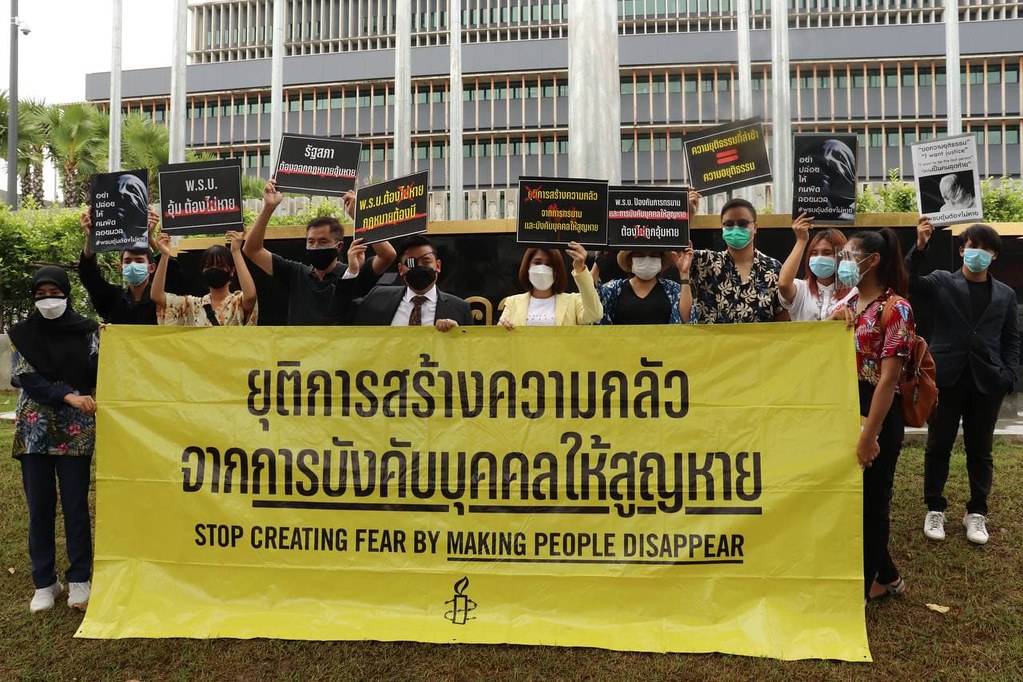Amnesty International calls on the Thai authorities to pass a law which includes definitions of torture and enforced disappearances in full accordance with international law and offers justice to victims, after the Thai parliament voted yesterday (16 September) to approve the first reading of a bill criminalizing torture and enforced disappearance.

Activists and relatives of victims of enforced disappearance went to parliament last week to call for the immediate passing of a bill criminalizing torture and enforced disappearance
Responding to the Thai parliament’s vote to approve in principle a draft law that seeks to criminalize both torture and enforced disappearances in Thailand for the first time, Emerlynne Gil, Amnesty International's Deputy Regional Director for Research, said:
“Amnesty International welcomes today’s development, which marks the first time legislation on these crimes has reached this stage. This symbolic act shows that the government recognizes the need to protect people against these heinous violations and to provide long-overdue justice to victims and their families.”
“Authorities must now take the next steps and ensure the existing draft laws are further developed to fully comply with Thailand’s international human rights obligations – and then swiftly enacted.”
“The government’s delay in making torture and enforced disappearances a criminal offence has denied victims’ access to justice and deterred others from coming forward. It has also sent a message to officials that they can carry out these violations with impunity.”
“Victims of torture and relatives of disappeared people – such as lawyer Somchai Neelapaijt and abducted activist Wanchalearm Satsaksit – have been campaigning for a law that would allow them to obtain justice, truth and reparation for their family members; this draft legislation, if amended, may provide a pathway for them to do so.”
“The vote to approve this draft law serves as a vital first step, but will not be not enough on its own. Recent news reports of police torture highlight the need for the government of Thailand to effectively address a culture of torture and abuse of powers by some officials.”
“Amnesty International calls on the authorities to pass a law that includes definitions of torture and enforced disappearances in full accordance with international law, places legal responsibility along all points of the chain of command and respects the legal principle of non-refoulement.”
We won't be scapegoated: Father spends 12 years seeking justice for tortured son
Victims oppose further delay for anti-torture bill
Background
The Thai parliament today voted to approve a draft law on the Prevention and Suppression of Torture and Enforced Disappearance Act and set out a timeline to pass the law by early 2022. After a seven-day period allowing for amendments, parliament will then seek to combine this draft law with three other draft bills on the same subject before submitting them to parliament again for review within 90 to 120 days.
The government first drafted the law in 2016, yet it remained on hold after authorities repeatedly amended, delayed and apparently suspended action on the legislation over recent years.
Crucial gaps remain in the recent draft legislation, including on issues related to detention safeguards, universal jurisdiction, the prohibition of accepting information obtained by torture as evidence, as well as concerns about the applicability of statutes of limitations.
Although Thailand ratified the United Nations Convention against Torture and other Cruel, Inhumane and Degrading Treatment or Punishment in 2007 and signed the United Nations International Convention for the Protection of All Persons from Enforced Disappearance in 2012, officials have continued to violate these conventions.
Amnesty International has documented widespread commission of torture and cruel, inhumane and degrading treatment by the Royal Thai Police and Royal Thai Army, and numerous cases of enforced disappearance. Human rights defenders, suspected insurgents, migrants, drug users and military conscripts in basic training are among the many victims of these crimes. In addition, Thai authorities have forcibly returned persons to countries where they are at risk of torture, in violation of the principle of non-refoulement.
The Thai authorities have also further compounded a prevailing culture of impunity by filing criminal proceedings against victims and human rights defenders who have made their concerns public.
Prachatai English is an independent, non-profit news outlet committed to covering underreported issues in Thailand, especially about democratization and human rights, despite pressure from the authorities. Your support will ensure that we stay a professional media source and be able to meet the challenges and deliver in-depth reporting.
• Simple steps to support Prachatai English
1. Bank transfer to account “โครงการหนังสือพิมพ์อินเทอร์เน็ต ประชาไท” or “Prachatai Online Newspaper” 091-0-21689-4, Krungthai Bank
2. Or, Transfer money via Paypal, to e-mail address: [email protected], please leave a comment on the transaction as “For Prachatai English”
